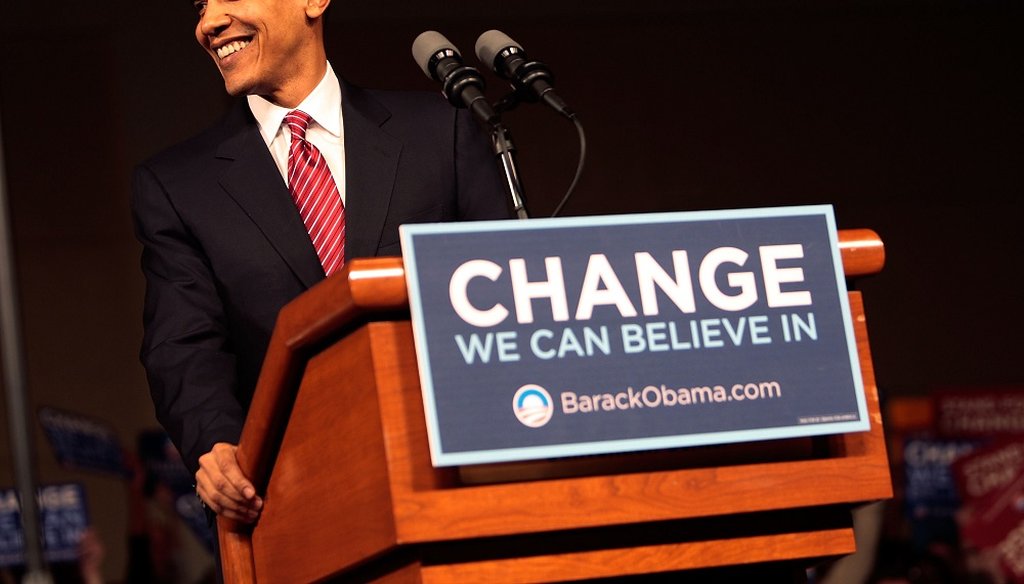Get PolitiFact in your inbox.

Presidential candidate Sen. Barack Obama (D-IL) takes the lectern at his victory rally at the Columbia Metropolitan Convention Center January 26, 2008 in Columbia, South Carolina. (Photo by Chris Hondros/Getty Images)
Editor’s note: PolitiFact will soon publish a series of reports outlining how President Barack Obama performed in keeping his campaign promises of 2008 and 2012. In-depth stories will look at the economy, health care, the wars in Iraq and Afghanistan, climate change and more. As a preview, this report outlines how Obama has performed on 25 specific pledges.
As he campaigned for president in 2008 and 2012, Barack Obama amassed a record of more than 500 campaign promises.
Some were almost oddly specific on policy (giving Al Gore a role on global warming, or increasing funding for programs that conserve lands and habitat for select species such as the Osceola turkey). A couple were light-hearted (get his daughters a puppy).
Other pledges — ending the wars in Iraq and Afghanistan, delivering a massive health care shakeup — will define his presidency for years to come.
PolitiFact has tracked all of Obama’s campaign promises (533, to be exact) over two elections, issuing ratings of Promise Kept, Compromise, Stalled, In the Works or Promise Broken.
The final results of his performance are in.
Here’s the rundown of his 25 biggest promises, going from Promise Kept to Compromise to Promise Broken.
Promises earn this rating when the original promise is mostly or completely fulfilled.
Train and equip the Afghan army
Since the 2001 invasion, the United States has spent about $68 billion training and equipping Afghan forces. On Obama’s watch, U.S forces dramatically decreased from 100,000 in 2011 to about 10,000 U.S. troops today, and most are there to "train, advise and assist" Afghan forces or are engaged in counterterrorism combat. Meanwhile, Afghanistan forces have more than doubled from 140,000 in 2009 to 320,000 in 2016, and operate without American or NATO support in 80 percent of their missions. With Afghan soldiers at the frontlines of the fight against the Taliban, Obama can count this one a Promise Kept.
Obama acted on his promise to end torture two days after taking office. His detailed executive order called for humane treatment of prisoners and specifically nullified interpretations of federal law issued by George W. Bush’s Justice Department. The order also prohibited the CIA from using detention centers and created a special team to deal with high-value suspected terrorists using humane techniques. While no directive is foolproof, advocates for human and civil rights groups agreed that Obama’s actions have been strong. Promise Kept.
Seek verifiable reductions in U.S. and Russian nuclear stockpiles
After a year of intense negotiations, the United States and Russia agreed to reduce the number of strategic nuclear warheads to 1,550 — down from the previous limit of 2,200. The New START arms control treaty also allows U.S. inspectors to verify reductions on-site at Russian nuclear bases. Obama laid much of the groundwork in talks with his Russian counterpart, Dmitry Medvedev and cleared the final hurdle when a two-third Senate majority ratified the treaty in late 2010. It was the first time that a Democratic president has both signed and pushed through an arms treaty with Russia. We rated this a Promise Kept.
Centralize ethics and lobbying information for voters
Obama kept his campaign promise to provide great transparency and disclosure of ethics and influence information in 2012. That spring, the administration unveiled ethics.gov, a comprehensive website of White House visitor records, Office of Government Ethics travel reports, Justice Department foreign agents registration data, and Federal Election Commission individual contribution reports, candidate reports and committee reports. Promise Kept.
Require more disclosure and a waiting period for earmarks
Congress helped Obama go above and beyond on his campaign promise to shed light on earmarks to curb their influence — a way of directing federal funding toward a specific purpose at the request of a specific lawmaker. Earmarks have essentially disappeared after both chambers enacted moratoriums during Obama’s first term, making this a Promise Kept.
Reform mandatory minimum sentences
The nation’s first black president made significant changes to the criminal justice landscape, starting with overseeing the first significant review of controversial federal drug sentencing laws since 1991. A section of the National Defense Authorization Act of 2010 required the U.S. Sentencing Commission — a panel that advises judges on prison sentences — to submit a review of sentencing guidelines to Congress. The report, available to read here, contains research on the effect of mandatory minimum penalties, their impact on sentencing disparities, and the federal prison population and possible alternatives to the laws. Obama can count this a Promise Kept.
Create new financial regulations
Overhauling the regulation of the financial system was one of Obama’s signature goals in the wake of the global recession he was inheriting. A year after he unveiled a broad outline for financial regulations, Congress passed the Dodd-Frank Act of 2010. It created agencies to protect consumers and monitor the U.S. economy and new revelations on mortgage lending, credit cards, proprietary trading, derivatives, hedge funds and executive pay. The law also ordered an audit of the Federal Reserve, called for a study on possible conflicts of interest in credit rating agencies, and gave the Federal Deposit Insurance Corporation the authority to liquidate large failing financial companies. Promise Kept.
The healthcare exchanges were designed primarily to serve small employers and people purchasing their own insurance, many of whom qualify for tax credits to help blunt the cost of premiums. But the exchanges opened up to anyone who didn’t like their employer-sponsored insurance, too. The caveat: If your employer offers insurance that meets government requirements for costliness and benefits, you probably won’t qualify for cost-sharing reductions, meaning you will likely pay the full price of the plan. Since this promise deals only with the issue of choice, not cost (we’ll get to that in a minute), we rate this Promise Kept.
Promises earn this rating when they accomplish substantially less than the official’s original statement but when there is still a significant accomplishment that is consistent with the goal of his original promise.
Begin removing combat brigades from Iraq
The United States remains entangled in Iraq despite Obama’s early promise to end the war. About 150,000 troops were deployed in Iraq when Obama entered office in 2009, and the last convoys left in December 2011. But since then, with the Islamic State gaining ground and the Iraqi military starting to crumble, the United States launched a new military operation, Inherent Resolve, in 2014. There are still about 5,000 U.S. soldiers in Iraq, and hundreds of U.S. troops have advised and assisted Iraqi forces in campaigns to retake the city of Mosul from ISIS. That’s far less than the number of troops in Iraq at the beginning of the Obama presidency, but it’s not a full withdrawal. We rated this a Compromise.
Cut taxes for 95 percent of American families
Back in 2008, Obama promised to enact a tax credit equivalent to approximately $500 for workers. He got his wish for tax years 2009 and 2010, but the Making Work Pay tax credit maxed out at $400, not $500. After the tax cut expired, Obama then negotiated a bipartisan tax package that include a tax "holiday" for payroll taxes (workers paid 4.2 percent instead of 6.2 percent in 2012). Since then, Obama revived his original promise in his 2015 State of the Union Address and 2016 fiscal year budget, but those proposals haven’t gone anywhere. All in all, this amounts to a Compromise.
Repeal the Bush tax cuts for higher incomes
The rich are paying more in taxes under Obama, but not as much as he wanted. In 2008, Obama proposed to allow the tax cuts enacted under his predecessor to expire. After agreeing to a two-year extension of the Bush-era rates, Obama came out with a Compromise. In late 2012, the White House and Congressional Republicans agreed to return the top marginal rate to 39.6 percent from 35 percent, but the income threshold was almost double what Obama proposed: $450,00 for joint incomes, rather than $250,000.
When the National Security Agency’s warrantless wiretapping program came into the public eye in 2008, then-candidate Obama pledged to provide more oversight and accountability in government surveillance practices. As president, Obama signed the USA Freedom Act in June 2015, which ended the bulk collection of metadata and instead requires the NSA to make the case that there are reasonable suspicions that its surveillance targets are linked to terrorism. But it’s unclear whether the government will give the Foreign Intelligence Surveillance Court enough information to perform its oversight function. In sum, the legislation limiting wiretapping is hardly ironclad and amounts to a Compromise.
Eight before Donald Trump was talking about a massive wall along the southern border, Obama pledged to tighten border control with additional personnel, infrastructure and technology. Obama has added more border control agents, fencing and detection to prevent border crossings. The number of people U.S. Immigration and Customs Enforcement removed reached an all-time high at 409,849 in 2012 before falling to 240,225 in 2016, according to ICE. At the same time, independent reports indicate that a good chunk of the border is still not secure. We rate this a Compromise.
Secure nuclear weapons materials in four years
Obama took interest in safeguarding the world’s nuclear weapons as a senator, and continued to pursue his goal into his presidency (and received a Nobel Peace Prize for his agenda in 2009). He oversaw a renewed commitment from more than 50 countries, continued the removal of plutonium and uranium, and implemented a 1991 bill that provides funding and expertise to former Soviet Union countries to dismantle their stockpiles. While Belarus, Kazakhstan and Ukraine are now nuclear-free, Russia pulled out of the deal in 2013 and said it would carry out its own efforts, giving pause to American experts. Measuring the success of Obama’s pledge to "detect and stop the smuggling of weapons of mass destruction" is also difficult, leading us to rate this a Compromise.
Sign a "universal" health care bill
Obama’s signature achievement — the Affordable Care Act — didn’t quite live up to his campaign goals. Undoubtedly, the law has reduced the uninsured population. But about 10 percent of the country remains without coverage, largely due to a 2012 Supreme Court decision that made it optional for states to expand Medicaid, the health care program for the poor. So far, 19 states have refused the expansion. By the latest estimates, 28.5 million people remained uninsured in 2015. We rate this a Compromise.
Obama has made progress toward his vision of a thriving clean energy economy. Thanks in part to tax credits for renewable technology, the number of "green" jobs has ballooned. As of March 2016, there were 2.5 million jobs in clean energy alone, and solar power jobs doubled in the past five years. But we can’t know for sure just how many of these jobs were created during Obama’s time in office, as the Bureau of Labor Statistics stopped counting "green" jobs in 2013 and there was no baseline to begin with. We rate this a Compromise.
The promise has not been fulfilled. This could occur because of inaction by the executive or lack of support from the legislative branch or other group that was critical for the promise to be fulfilled. A Promise Broken rating does not necessarily mean that the executive failed to advocate for the policy.
Create a foreclosure prevention fund for homeowners
The expectation was to offer relief to 9 million homeowners; the reality was a sliver of aid delivered. The Democratic-led Congress approved a multi-billion gesture to underwater homeowners — at $75 billion, an amount more than seven times what Obama promised — using the Troubled Asset Relief Program and the government sponsored mortgage giants Fannie Mae and Freddie Mac. But even the special inspector general for the Troubled Asset Relief Program called the housing program "a colossal failure" on the Treasury Department’s watch. Lax oversight and enforcement makes this a Promise Broken.
Close the Guantanamo Bay Detention Center
Obama significantly downsized the prisoner population at Guantanamo Bay, but the controversial detention center remains open. Obama’s repeated efforts to make good on this pledge have been met with consistent opposition from Congress. Two days after he was sworn in, Obama issued an executive order to close the prison at the U.S. Navy base in Cuba within one year. But Congress refused to fund the shuttering of the facility. While Obama reduced the number of detainees by 76 percent and made a number of changes to detention policies (such as giving military trials for prisoners, creating a periodic review process, allowing transfers to foreign countries, creating a Pentagon post to handle transfers), these actions fall short of closing Guantanamo. We rate this Promise Broken.
Tougher rules against revolving door for lobbyists and former government officials
On his first day in office, Obama signed an executive order placing restrictions on lobbyists working in the White House, as he promised to do during the campaign. But the order contained loopholes. The Obama administration has granted waivers to several former lobbyists and allowed lobbyists to recuse themselves from discussions on lobbying interests. That flatly contradicts his pledge that no lobbyists would "work on regulations or contracts directly and substantially related to their prior employer for two years." Promise Broken.
Provide a path to citizenship for undocumented immigrants
The Supreme Court and Congress have blocked Obama’s efforts to help millions of illegal immigrants temporarily avoid deportation. In 2013, the Senate unveiled an immigration bill that included a path to citizenship for undocumented immigrants, but it went nowhere in the House. Obama then acted on his own, announcing two programs by executive order to delay the deportation of undocumented immigrants who arrived as children and those who have U.S.-citizen children. These intended to provide temporary reprieve with the hopes that Congress would ultimately agree on a path to citizenship. But on June 23, 2016, the Supreme Court deadlocked 4-4 on a case related to the efforts. We rate this a Promise Broken.
Reduce oil consumption by 35 percent by 2030
The United States continues to guzzle gas, and more of it. While Obama set new standards for fuel efficiency, curbing oil use, it hasn’t been enough. In 2009, the United States consumed 18.7 million barrels of oil every day. In 2015, the U.S. consumed more, about 19.4 million barrels per day. By 2030, the U.S. is projected to use 19.1 million barrels per day. That’s a slight decrease from 2015 and less oil than what the government previously predicted (20.2 million barrels) but consumption is not on track on to drop by a dramatic of a pace as Obama’s goal. Promise Broken.
Create cap and trade system with interim goals to reduce global warming
In the early days of the Obama presidency, it seemed like the impossible had a chance of becoming reality: The Democratic-led House of Representatives passed legislation to address climate change. The House bill set limits on carbon emissions and then permitted companies to buy and sell carbon allowances, called cap and trade. But the plan that passed in June 2009 never made it to a vote in the Senate. Obama himself acknowledged defeat and a Promise Broken when he said cap-and-trade was "just one way of skinning the cat" and he’d pursue his goal through other means. (Which he did.)
Cut the cost of a typical family's health insurance premium by up to $2,500 a year
Dubbed one of the most audacious pledges of the campaign, Obama’s promise to cut the annual cost of insurance by $2,500 was perhaps too bold. The average sticker price for family coverage is actually almost $5,500 more than it was when he took office ($12,680 in 2008 versus $18,142 in 2016). It should be noted that average family premiums have actually been increasing at historically slow rates under Obama (about 20 percent from 2011 to 2016 versus 31 percent from 2006 to 2011, and 63 percent from 2001 to 2006). But that doesn’t negate the fact that they’re still rising. We rated this Promise Broken.
Bring Democrats and Republicans together to pass an agenda
Obama campaigned on a message of hope and unity, but bitter gridlock and increasing partisanship has come to define the political climate today. Congress has set or matched records year after year for polarization. Republicans voted almost entirely along party lines, and against Democrats the good majority of of the time in 2015. There is, however, a silver lining: While 2010 to 2014 were among the least productive legislative sessions in modern history, Congress actually passed the most laws since Obama took office in 2015, just not the ones Obama wanted. We rated this Promise Broken.
Our Sources
See individual promises for sources










































